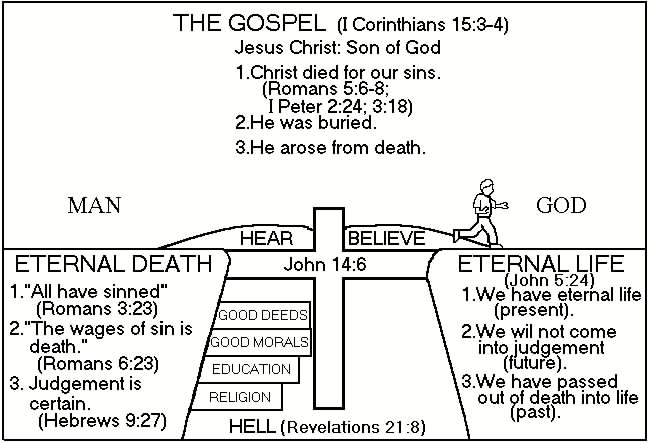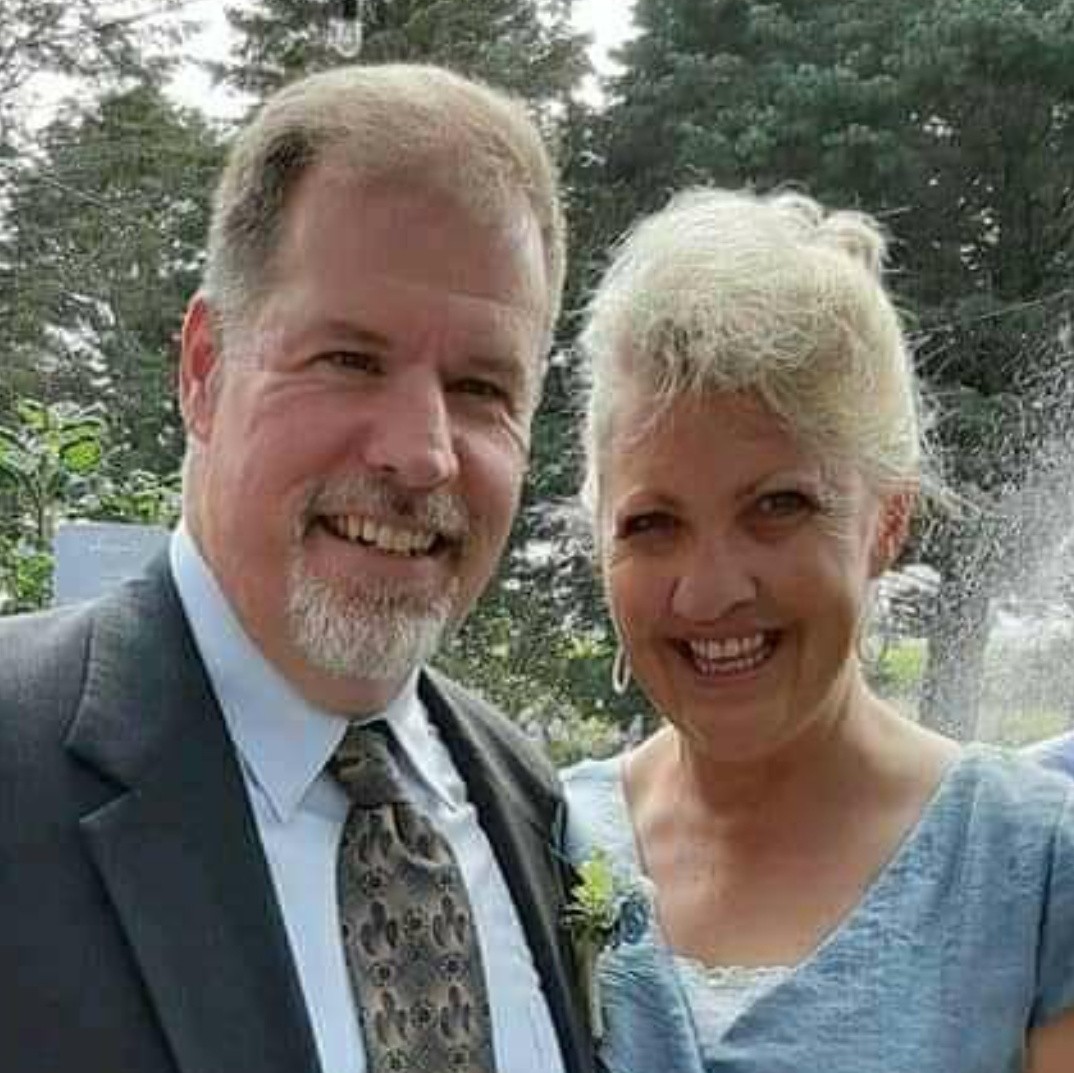
The Gospel: Our Response
I explained the Great News of God's Salvation in my last post, and previously provided the context that makes that news so great. But just as leaving someone with only the bad news is bad, so it is tragic to offer someone a solution without showing them how to make use of it. In this final email on the Bridge Illustration, we'll clear that up.
Our Response

With this picture we complete the Bridge Illustration. Christ, by the power of His God-nature and by His death and resurrection, has paid the penalty for our sin. He has become the Bridge to bring us back to God. But this Bridge isn't a physical bridge you can simply walk or drive across; it's a spiritual bridge! How do we actually cross over such a Bridge to enter into God's presence? We find the answer in John 5:24:
- Jesus said, "Whoever hears My word and believes Him who sent Me..." ("Hear" and "Believe" are written above each of the arrows across the top of Jesus' cross). Only two things are needed in order to cross the Bridge, to be reconciled to God and enter into a relationship with Him: That we hear and understand who Jesus is and what He has done for us, and that we believe who He is and what He has accomplished for us.
- "Has eternal life...": Those who hear and believe are immediately granted eternal life, as opposed to eternal death and separation from God. It is a present possession.
- "Will not be condemned...": They are promised never to be condemned. Though there remains a judgment for Believers, it will be a judgment of rewards for how they lived (or failed to live) as a child of God, rather than a judgment to determine their eternal destination. Those who hear and believe have their eternal destination set, and it is eternity in the presence of God. Jesus Christ has paid the penalty for our sin; our sins are paid, forgiven, and blotted out forever. It is a promise for the future, rooted in a completed transaction.
- "He has already crossed from death to life": The person who hears and believes this Gospel has already--at the moment he believed--entered into the presence of God. He has crossed from Man's side of sin, death and judgment to God's side, his eternal life with God already begun, though his body may yet pass away. The Holy Spirit has already taken up residence with his spirit. He has already entered the family of God; he is now a child of God (John 1:12). It is an event already passed, completed at the moment he chose to believe what he had heard about the person and work of Jesus Christ.
And that completes the Bridge Illustration, but not our time with an eager listener. To stop here in our discussion with a friend would be like throwing a net overboard, hoping to catch some fish, but forgetting to hang onto it!
Drawing the Net
Peter, Andrew, James and John were commercial fishermen. They cast their net into the waters, but didn't let them go. Instead, they let them sink a ways, maybe drag along behind them a bit, then pulled them back in to see what they caught. This is the type of fishing they had in mind when Jesus called them to fish for men. On occasion your hearer will interrupt your explanation of the Bad News, begging to know what they must do to be saved (Acts 2:37). That was Peter's experience when preaching his first message after Jesus' ascension. He answered them, then continued urging them to be saved from that evil generation (Acts 2:38-41). More often, though, we'll need to help them engage with the Holy Spirit in what may be their only chance to wrestle through this life-and-death decision. That's the urging that Peter did at that first evangelistic meeting, and what Paul called us to do in 2 Corinthians 5 and 6.
Roy Robertson, the Navigators' first international missionary, taught his disciples to "draw the net," to lead someone through the process of facing this decision and making it, with these three questions:
- Do you understand what you've heard? Give your hearers a chance to ask any clarifying questions, but keep them focused on the content you've shared with them. They might have plenty of rabbit trails to offer you; don't take them. Offer to talk about those when you finish these questions; in the meantime keep them focused on the Gospel. And without understanding, they'll have a hard time making a clear and genuine decision to believe. If they have no (further) questions, then ask your second question:
- Now that you have heard and understood these things, are you willing to believe that Jesus is God's Son, that He died for your sins and rose to life again? In fishing parlance, this question "sets the hook"—or else it misses, depending on God's working in their heart. This is the goal of our sharing the message: to see a person believe. If we simply explain the Gospel and leave, they can too easily file it away and forget it. Of course, the Holy Spirit can work on their hearts and keep bringing these things to mind, but by asking such a question, we help to instigate the spiritual battle that must take place. Satan is all too ready to snatch away the seed we've planted in their hearts (Mark 4:14); we want to help it sprout roots and stick. This is the kind of question that helps that happen. And it is important to ask the question, then quietly wait for their answer. Let them wrestle with the Spirit; God forbid we become a distraction to that battle out of concern that we may have caused them discomfort! The question itself is not difficult or cruel, though the battle it invites can be fierce. We need to let them struggle through to an answer; we don't want to keep talking and possibly minimize the impact of the question. Let them wrestle with God. And remember, the worst they can say is, "No." And whether or not that threatens your budding relationship with this hearer is entirely up to you. As long as you indicate clearly that their answer doesn't affect your relationship with them, then it shouldn't. However, once they know where you stand and what is most important to you, they may not be so interested in developing a relationship with you. That is their choice and their right to decide. We have no cause to be ashamed if the Gospel separates us from potential new friends. In fact, they now know to whom to turn should the Lord continue working in their heart and bring them to a point of repentance. If you convey a willingness to continue the friendship and make clear where they can find you, then they will know the door remains open.
If they indeed answer, "No," I may ask them what is keeping them from receiving Christ's sacrifice on their behalf, what is keeping them from crossing the Bridge. If their answer is something I can help them work through, I'll try. But I don't want to start a debate. I can't argue someone into God's Kingdom; the Spirit has to convict them into it. But I can graciously and gently offer some Scriptural answers to their struggles. If they still don't cross, I'll make a point to clarify with them where they stand (on Man's side) and what remains between them and God. They have heard, they have professed to understand; all that remains is for them to believe in Jesus as God's Son, who died for their sins and rose to life again. If at some future point they embrace that, they will be just as much a child of God as if they had done it with me right there. No matter what, I encourage them to find a Bible-teaching church and invite them to mine. I also make clear that I'd be glad to meet with them again to help them understand more, if they're so interested.
But if they should answer, "Yes," then there's one more question I want to ask them in order to "draw the net" or "reel them in." - Are you willing to pray right now and tell God that you believe that Jesus is God's Son, that He died for your sins, and that He rose from the dead? The previous question brings a person to the point where they are willing to believe in Jesus in a general way; this question calls them to make and confirm that decision now. It brings the whole of our presentation down to this moment. They may be open to believing in Jesus, but they may not yet be ready to embrace Him and claim Him as their Savior. The key to this question is the "right now" and the "tell God." Scripture tells us to call on the name of the Lord to be saved: It is with our mouth that we confess, but it is in our hearts that we believe (Romans 10:9,10,13). The confessing doesn't save us, it only expresses the believing that does. I make clear to those who are willing to pray "right now" that it is not the words that are so important, but what is going on in the heart. God sees the intention of their heart and based on that, if they truly accept Jesus as the Savior from their sins and condemnation, then the Lord takes them as His own. But I can't see their heart; I can only rejoice with them based on what comes out of their mouth. So I ask them to pray out loud, and I ask them to use their own words. I do not lead a person in prayer phrase by phrase. I want to know what they have understood, not whether they are good at copying what I say. I also don't want them to simply read a pre-recorded prayer aloud. My goal is to know whether or not they have understood and embraced these things, and I believe that is best accomplished by having them pray aloud in their own words according to their own understanding. So as I explain what prayer is and what I am asking them to tell God, I point them again and again to the heart of the Gospel written at the top of the Bridge Illustration: Jesus, the Son of God; died for our sins; was buried; rose from the dead. I ask them to tell God that they now believe those things about Jesus. If a person needs more encouragement than that, I might pray first as an example, expressing my thanks to God for revealing these things to me many years before and bringing me to believe in them; I might also thank Him for the forgiveness and new relationship with God it brought me. When I finish praying, I let them pray. Based on what they pray, I might have to give a little more guidance as to what I'm asking them to tell God, if indeed it's true of their heart. But most people who genuinely desire to trust Christ have no trouble praying.
Once a person prays, of course, I rejoice with them and congratulate them on joining the family of God. I share with them John 1:12, which I've been hinting at in our conversation. I let them know that as a new-born child of God, there is still so much they have to learn about their Heavenly Father and about living in His family. I introduce them to the importance of meeting and learning together with other Christians in some kind of church fellowship. Of course, I invite them to the church I attend. I also warn them that they will probably have doubts about the simplicity of salvation in Jesus Christ, so I show them John 5:24 and encourage them to memorize it. That is the basis for our salvation: Jesus said that those who hear and believe have eternal life, will not be condemned; they have already crossed from death to life. It's God's promise and He will do what He says.
I also offer to continue meeting with them to help guide them in their growth as a child of God. My goal is to meet with them as soon as possible within the first week of their salvation. What I do in that first meeting is very important, but I'll have to wait till next time to explain.
Resources
- The Bridge Illustration - A clear and complete explanation of the only way man can be reconciled with God
- Prayer Pages - A tool to help keep track of and manage prayer needs.
- Personal Reading Record - A tool to help you keep track of where you've read and where to read next
- Bible Reading Highlights Record - A tool to help you record your thoughts and applications when you read the Word
- The Timothy Training Workbook - A printable (front & back) discipleship notebook written by veteran Navigator missionary and founder of Training Evangelistic Leadership, Roy Robertson
Courtesy of Roy Robertson and Training Evangelistic Leadership

